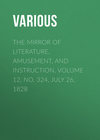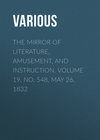Читать книгу: «The Mirror of Literature, Amusement, and Instruction. Volume 12, No. 324, July 26, 1828», страница 4
The reader will doubtless conclude that, now at least, having satisfactorily settled his demands, I had done with my Tormentor for ever. This inference is in part correct. I followed up my vocation with an energy strangely contrasted with my recent indifference, was early and late in the schools, and for three months pursued this course with such ardour, that my adventures with the Mysterious Tailor, though not forgotten, were yet gradually losing their once powerful hold on my imagination. This was precisely the state of my feelings, when early one autumnal morning, just seven months from the date of my last visit to High Holborn, I chanced to be turning down Saint Giles's Church, on my way to—Hospital. I had nothing to render me more than usually pensive; no new vexations, no sudden pecuniary embarrassment; yet it so happened, that on this particular morning I felt a weight at my heart, and a cloud on my brain, for which I could in no way account. As I passed along Broad Street, I made one or two bold attempts to rally. I stared inquisitively at the different passers by, endeavouring, by a snatch at the expression of their faces, to speculate on the turn of their minds, and the nature of their occupations; I then began to whistle and hum some lively air, at the same time twirling my glove with affected unconcern; but nothing would do; every exertion I made to appear cheerful, not only found no answering sympathy from within, but even exaggerated by constrast my despondency. In this condition I reached Saint Giles's Church. A crowd was assembled at the gate opposite its entrance, and presently the long surly toll of the death-bell—that solemn and oracular memento—announced that a funeral was on the eve of taking place. The funeral halted at the entrance gate, where the coffin was taken from the hearse, and and thence borne into the chancel. This ceremony concluded, the procession again set forth towards the home appointed for the departed in a remote quarter of the church-yard. And now the interest began in reality to deepen. As the necessary preparations were making for lowering the coffin into earth, the mourners—even those who had hitherto looked unmoved—pressed gradually nearer, and with a momentary show of interest, to the grave. Such is the ennobling character of death.
The preparations were by this time concluded, and nothing now remained but the last summons of the sexton. At this juncture, while the coffin was being lowered into its resting place, my eyes, accidentally, it may be said, but in reality by some fatal instinct, fell full upon the lid, on which I instantly recognised a name, long and fearfully known to me—the name of the Mysterious Tailor of High Holborn. Oh, how many thrilling recollections did this one name recal? The rencontre in the streets of London—the scene at the masquerade—the meeting at Bologne—the storm—the shipwreck—the sinking vessel—the appearance at that moment of the man himself—the subsequent visions of mingled fever and insanity: all, all now swept across my mind, as for the last time I gazed on the remains of him who was powerless henceforth for ever. In a few minutes one little span of earth would keep down that strange form which seemed once endowed with ubiquity. That wild unearthly voice was mute; that wandering glance was fixed; a seal was set upon those lips which eternity itself could not remove. Yes, my Tormentor—my mysterious—omnipresent Tormentor was indeed gone; and in that one word, how much of vengeance was forgotten! I was roused from this reverie by the hollow sound of the clay as it fell dull and heavy on the coffin-lid. The poor sleeper beneath could not hear it, it is true; his slumber, henceforth, was sound; the full tide of human population pressing fast beside the spot where he lay buried, should never wake him more: no human sorrow should rack his breast, no dream disturb his repose; yet cold, changed, and senseless as he was, the first sound of the falling clods jarred strange and harsh upon my ear, as if it must perforce awake him. In this feverish state of mind I quitted the church-yard, and, on my road home, passed by the shop where I had first met with the deceased. It was altered—strangely altered—to my mind, revoltingly so. Its quaint antique character, its dingy spectral look were gone, and there was even a studied air of cheerfulness about it, as if the present proprietor were anxious to obliterate every association, however slight, that might possibly remind him of the past. The former owner had but just passed out, his ashes were scarcely cold, and already his name was on the wane. Yet this is human nature. So trifling, in fact, is the gap caused by our absence in society, that there needs no patriotic Curtius to leap into it; it closes without a miracle the instant it is made, and none but a disinterested Undertaker knows or cares for whom tolls our passing bell.
Monthly Magazine.
SPIRIT OF THE PUBLIC JOURNALS
THE TOUR OF DULNESS
From her throne of clouds, as Dulness look'd
On her foggy and favour'd nation,
She sleepily nodded her poppy-crown'd head,
And gently waved her sceptre of lead,
In token of approbation.
For the north-west wind brought clouds and gloom,
Blue devils on earth, and mists in the air;
Of parliamentary prose some died,
Some perpetrated suicide,
And her empire flourish'd there.
The Goddess look'd with a gracious eye
On her ministers great and small;
But most she regarded with tenderness
Her darling shrine, the Minerva Press,
In the street of Leadenhall.
This was her sacred haunt, and here
Her name was most adored,
Her chosen here officiated.
And hence her oracles emanated,
And breathed the Goddess in every word.
She pass'd from the east to the west, and paused
In New Burlington-street awhile,
To inspire a few puffs for Colburn and Co.
And indite some dozen novels or so
In the fashionable style.
Then turning her own Magazine to inspect,
She was rather at fault, as of late
The colour and series both were new;
But the Goddess, with discernment true,
Detected it by the weight.
She cross'd the Channel next, and peep'd
At Dublin; but the zeal
Of the liberty boys soon put her to flight.
And she dropp'd her mantle in her fright,
Which fell on Orator Shiel.
Thence sped she to the Land of Cakes,
The land she loves and its possessors;
She loves its Craniologists,
Political Economists,
And all Scotch mists and Scotch Professors.
And chiefly she on McCulloch smiled,
As a mother smiles on her darling child,
Or a lady on her lover;
Then, bethinking her of Parliament,
She hasten'd South, but ere she went,
She promised if nothing occurr'd to prevent,
To return when the Session was over.
Blackwood's Magazine.
CANNIBALISM
In great cities, cannibalism takes an infinite variety of shapes. In the neighbourhood of St. James's-street there are numerous slaughter-houses, where men are daily consumed by the operation of cards and dice; and where they are caught by the same bait, at which Quin said he should have infallibly bitten. A similar process is likewise carried on in 'Change Alley, on a great scale; not to speak of that snare especially set for widows and children, called a "joint stock speculation." But your cannibal of cannibals is a parliament patron. Here, a great borough proprietor swallows a regiment at a single gulp; and there, the younger son of a lord ruminates over a colony till the very crows cannot find a dinner in it; and there again, a duke or a minister, himself and his family, having first "supped full of horrors," casts a diocese to the side-table, to be mumbled at leisure by his son's tutor. The town is occasionally very indignant and very noisy against the gouls of Surgeons' Hall, because they live upon the dead carcasses of their fellow-creatures; while, strange to say, it takes but little account of the hordes of wretches who openly, and in the face of day, hunt down living men in their nefarious dealings as porter brewers, quack doctors, informers, attorneys, manufacturers of bean flour, alum, and Portland stone; and torture their subjects like so many barbacued pigs, in the complicated processes of their cookery.—New Month. Mag.
SIGNS OF THE TIMES
"They say this town is full of cozenage,
As nimble jugglers that deceive the eye,
Disguised cheaters, prating mountebanks,
And many such like libertines of sin."
SHAKSPEARE.
Caveat emptor! This is the age of fraud, imposture, substitution, transmutation, adulteration, abomination, contamination, and many others of the same sinister ending, always excepting purification. Every thing is debased and sophisticated, and "nothing is but what is not." All things are mixed, lowered, debased, deteriorated, by our cozening dealers and shopkeepers; and, bad as they are, there is every reason to fear that they are "mox daturos progeniem vitiosiorem." We wonder at the increase of bilious and dyspeptic patients, at the number of new books upon stomach complaints, at the rapid fortunes made by practitioners who undertake (the very word is ominous) to cure indigestion; but how can it be otherwise, when Accum, before he took to quoting with his scissors, assured us there was "poison in the pot;" when a recent writer has shown that there are still more deleterious ingredients in the wine-bottle; and when we ourselves have all had dismal intestine evidence that our bread is partly made of ground bones, alum, plaster of Paris; our tea, of aloe-leaves; our beer, of injurious drugs; our milk, of snails and chalk; and that even the water supplied to us by our companies is any thing rather than the real Simon Pure it professes to be. Not less earnestly than benevolently do our quack doctors implore us to beware of spurious articles; Day and Martin exhort us not to take our polish from counterfeit blacking: every advertiser beseeches the "pensive public" to be upon its guard against supposititious articles—all, in short, is knavery, juggling, cheating, and deception.—Ibid.
Покупайте книги и получайте бонусы в Литрес, Читай-городе и Буквоеде.
Участвовать в бонусной программе




















